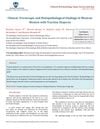 2 citations,
October 2023 in “Dermatology practical & conceptual”
2 citations,
October 2023 in “Dermatology practical & conceptual” More research is needed to understand hair and scalp disorders in people with skin of color.
 2 citations,
August 2016 in “Lasers in Surgery and Medicine”
2 citations,
August 2016 in “Lasers in Surgery and Medicine” Photodynamic therapy can remove nonpigmented hair in mice and might work for humans.
 2 citations,
November 2015 in “Actas Dermo-Sifiliográficas”
2 citations,
November 2015 in “Actas Dermo-Sifiliográficas” The document suggests a possible link between mast cells and scarring alopecia, recommending more research for potential treatments.
 2 citations,
October 2015 in “Primary Care: Clinics in Office Practice”
2 citations,
October 2015 in “Primary Care: Clinics in Office Practice” Doctors should diagnose hair loss by examining the patient and possibly doing tests, and then treat it based on the type, which may prevent permanent hair loss.
 1 citations,
July 2023 in “Al-Azhar Medical Journal”
1 citations,
July 2023 in “Al-Azhar Medical Journal” Higher antigliadin antibodies are linked to more severe alopecia areata, suggesting screening for celiac disease in these patients.
 1 citations,
May 2014 in “European Journal of Inflammation”
1 citations,
May 2014 in “European Journal of Inflammation” A lotion with minoxidil, hydrocortisone butyrate, and 17a-estradiol can improve or stabilize Frontal Fibrosing Alopecia in some cases, but there's no universally-accepted treatment yet.
 1 citations,
July 2010 in “Dermatologic Surgery”
1 citations,
July 2010 in “Dermatologic Surgery” Splitting one hair follicle into two can help regrow hair with a 50% to 70% success rate, useful when donor hair is limited.

Intradermotherapy with minoxidil is as effective as topical application for treating hair loss.

GFC injections significantly improved hair growth and quality with minimal side effects.
 May 2024 in “Medicine today”
May 2024 in “Medicine today” Older age, family history, and low iron levels increase the risk of female hair loss.
 May 2024 in “Clinical, cosmetic and investigational dermatology”
May 2024 in “Clinical, cosmetic and investigational dermatology” 5% topical minoxidil effectively treated a boy's congenital triangular alopecia without side effects.
 April 2024 in “International Journal of Research Publication and Reviews”
April 2024 in “International Journal of Research Publication and Reviews” Alopecia areata causes hair loss with varied treatment responses and frequent relapses.
 February 2024 in “PloS one”
February 2024 in “PloS one” Tofacitinib and adalimumab are promising treatments for cicatricial alopecia with few side effects.
 January 2024 in “Dermatology practical & conceptual”
January 2024 in “Dermatology practical & conceptual” Male gender and family history predict alopecia areata recurrence.
 November 2023 in “Berkala Ilmu Kesehatan Kulit dan Kelamin/Berkala ilmu kesehatan kulit dan kelamin (Periodical of dermatology and venerology)”
November 2023 in “Berkala Ilmu Kesehatan Kulit dan Kelamin/Berkala ilmu kesehatan kulit dan kelamin (Periodical of dermatology and venerology)” A dermoscope helps accurately tell apart Pityrosporum folliculitis and Acne vulgaris.
 October 2023 in “Dermatology practical & conceptual”
October 2023 in “Dermatology practical & conceptual” Folliculitis Decalvans and Frontal Fibrosing Alopecia can coexist in people with darker skin, showing features of both conditions.

A rare case of a woman having both lichen planus pigmentosus and classic lichen planopilaris at the same time.
 August 2023 in “International journal of research in Ayurveda and pharmacy”
August 2023 in “International journal of research in Ayurveda and pharmacy” Garudan Kizhangu Ennai may effectively treat alopecia areata but needs more research to confirm its safety and effectiveness.
 August 2023 in “JOJ dermatology & cosmetics”
August 2023 in “JOJ dermatology & cosmetics” Antibiotics often cause skin reactions, making them a major health concern.
 June 2023 in “Dermatology and therapy”
June 2023 in “Dermatology and therapy” The Middle East and Africa need better data, treatment consensus, and support for Alopecia Areata.
 February 2023 in “International Journal of Medical Arts”
February 2023 in “International Journal of Medical Arts” Trichloroacetic acid is a safe and effective treatment for hair loss in alopecia areata patients.
 December 2022 in “Rossijskij žurnal kožnyh i veneričeskih boleznej”
December 2022 in “Rossijskij žurnal kožnyh i veneričeskih boleznej” New treatments for child hair loss due to immune issues are effective but not yet officially approved.

Vitamin D is crucial for skin health and managing skin diseases.
 January 2022 in “Al-Azhar Medical Journal”
January 2022 in “Al-Azhar Medical Journal” Higher antigliadin antibody levels are linked to alopecia areata severity.
 December 2020 in “bioRxiv (Cold Spring Harbor Laboratory)”
December 2020 in “bioRxiv (Cold Spring Harbor Laboratory)” Stress can cause a type of hair loss in mice lacking the CCHCR1 gene.
 January 2020 in “Clinical dermatology open access journal”
January 2020 in “Clinical dermatology open access journal” Changing certain hairstyles can prevent worsening hair loss in Mexican women.
 November 2019 in “Harper's Textbook of Pediatric Dermatology”
November 2019 in “Harper's Textbook of Pediatric Dermatology” Understanding normal hair growth and loss in children is key to diagnosing and treating hair disorders.
 March 2019 in “Journal of Investigative Dermatology”
March 2019 in “Journal of Investigative Dermatology” Seborrheic dermatitis is influenced by diet, genetics, and psychological factors.
 January 2019 in “ARC journal of pharmaceutical sciences”
January 2019 in “ARC journal of pharmaceutical sciences” Acne can be managed with various treatments and requires psychological support due to its emotional impact.
 October 2018 in “Journal of the European Academy of Dermatology and Venereology”
October 2018 in “Journal of the European Academy of Dermatology and Venereology”





























